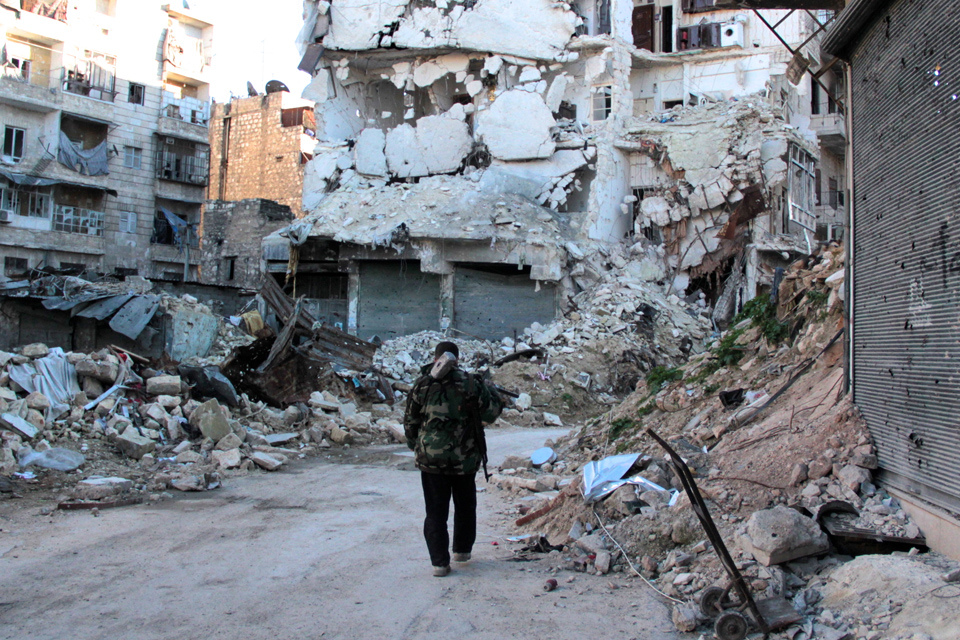In the long dark night that is the Syrian nightmare, the White Helmets have become the only ray of light.
In an earlier PRIO blog post, Erica Chenoweth observed that “there are really two types of Nobel Peace Prize Laureates – elites (or elite-led institutions) and ordinary people.” This year, for example, the Colombian nominees President Juan Manuel Santos and the FARC guerilla leader Timoleón Jiménez, one of the duos on PRIO Director Kristian Berg Harpviken’s shortlist, would be an example of the former, while the Syrian Civil Defence, or the White Helmets as they are better known as, clearly represent the latter.

Aleppo under siege. PHOTO: CC2.0
At least the volunteers behind the White Helmets used to be “ordinary people”, such as blacksmiths, tailors, builders and gymnastic teachers. After the escalation of the Syrian crisis, however, their daily tasks are nowhere close to ordinary. They run onto the streets when others take hide, scouting the horizon for the place of the latest impact of the bombs dropped from the jet planes above. Often they are the first to arrive, and then their work begins. Body after body; old people, adults, youth, kids, and babies are located and lifted out of the pile of rubble that used to be their homes. Some are saved, others stand no chance. They work long hours these days, the white helmet rescue-workers.
Originally established in 2013, the SCD counts around 2900 civilians, spread around Syria in 120 different centers. Lead by Raed al-Saleh, their motto, taken from, the Quran, is: “To save a life is to save all of humanity.” And the Helmets operate according to their motto on a strict humanitarian principle, they claim to make no distinction regarding whom they save. They work in 7 provinces in Syria; Idlib, Hamah, Aleppo, Homs, Daraa, Damascus Countryside, and the capital itself. Having said that, there is little doubt that it is one side – the Assad regime – that are mostly responsible for keeping them busy.
The White Helmets are featured on a Netflix-documentary, and there has even been a celebrity campaign for their Nobel nomination. Names like Ben Affleck, Justin Timberlake, Daniel Craig, Chris Martin, Susan Sarandon, as well as two Norwegian authors, Karl Ove Knausgård and Linn Ullmann, are among the individuals that have been listed as supporting the White Helmets for the Nobel Peace Prize. In his speculations, Kristian Berg Harpviken suggests that this rush of celebrities might actually hurt, rather than promote, their chances of winning the Nobel. Either way, and aside from the question of their candidacy, it seems that their newly-won fame does hurt them, though in a more direct and lethal way. Just during the last week, three of the group’s four operation centers in rebel held east-Aleppo have been severely hit and damaged by the regime’s bombs. Two of the four centers are reportedly wiped out. More than 130 of the volunteers in the White Helmets have been killed since they started their work. The atrocious practice of the so-called “double tap”, where the regime jets return to the scene of a recent bombing, in order to destroy anyone who has dared to come to the rescue, is proving particularly lethal for those that rush there to help.
That humanitarian efforts are politicized, and humanitarian workers deliberately targeted, has become one of the tragic trademarks of the Syrian crisis. International law and the rules of war are violated non-stop, and thus awarding the prize to the humanitarian workers of the White Helmets would be an important reminder from the Norwegian Nobel Committee that these are principles that the international community is obliged to hold higher. If we let this madness continue unabated, Jan Egeland, Secretary General of the Norwegian Refugee Council, has argued, we would be “erasing a century of progress for humanity”.
“Does anybody here need rescuing?”, one of the White Helmets call out, as he searches through a building in the Netflix documentary. The question is as simple as its answer is devastating. Yes, there are thousands of Syrians that need it, and perhaps also humanity itself?
As always, there are lots of well-deserved nominations to this years Nobel Peace Prize, and among the many, the bakers and the blacksmiths, the tailors and the teachers underneath those white construction helmets, stand out as a dignified, inspiring and remarkable group of “ordinary” people.